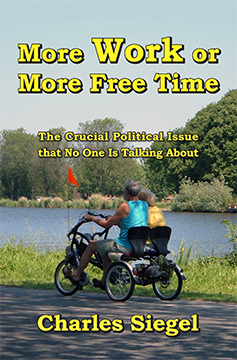
More Work or More Free Time
The Crucial Political Issue that No One Is Talking About
by Charles Siegel
copyright © 2022 by Charles Siegel
Preview:
|
Creating Jobs?
Americans believe we need rapid economic growth to create jobs and avoid unemployment—but that is because we do not have the choice of working shorter hours.
The Dutch have a better model. By law, they can choose to work part time, which means they avoid unemployment by creating the amount of work people actually want rather than by creating full-time jobs.
We have reached the point where economic growth no longer brings significant benefits. International comparisons show that higher income no longer improves a nation’s happiness, health, or educational achievement significantly after it reaches about two-thirds of the current American level. And postwar America’s push to promote automobile use to stimulate the economy actually made our cities less livable.
The average American employee works 25% more than the average Dutch employee, but the available measures of well-being show that all the extra work doesn’t do us any good.
In the course of this century, most nations of the world could emerge from poverty and have a comfortable middle-class standard of living if we can avoid ecological crisis. But that is a big “if.”
To create a sustainable economy with a high quality of life, it is essential for the world to follow the Dutch model of shorter work hours and slower growth rather than the postwar American model of long work hours and rapid growth. But no mainstream politician is talking about the crucial issue of work time.


